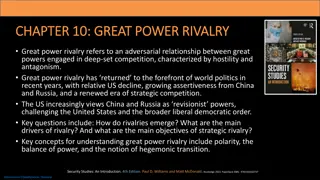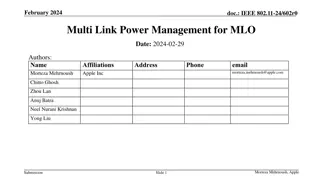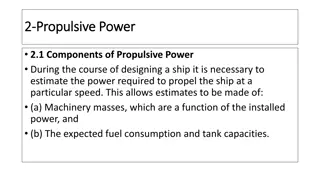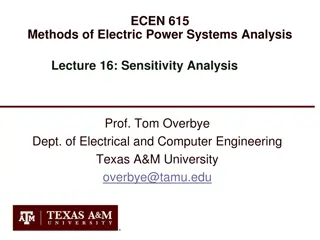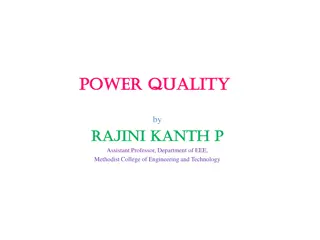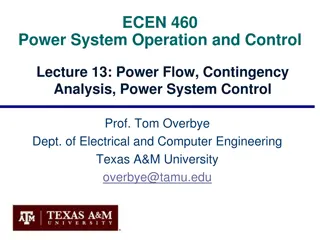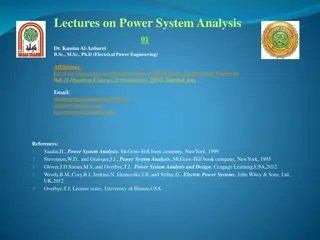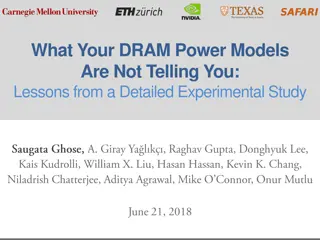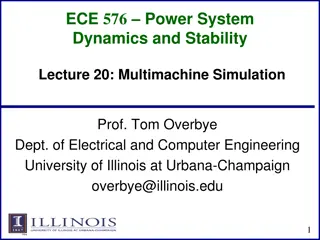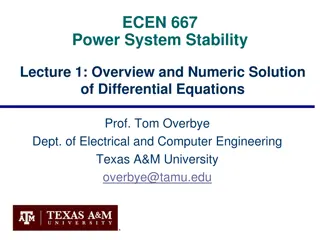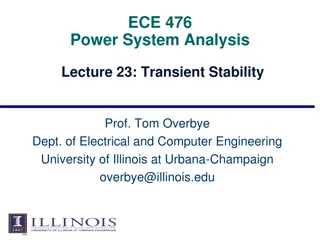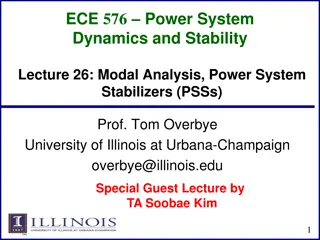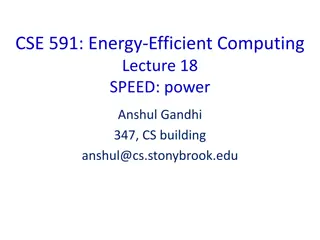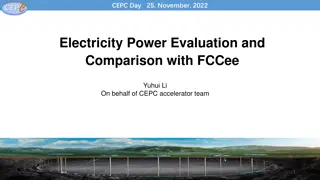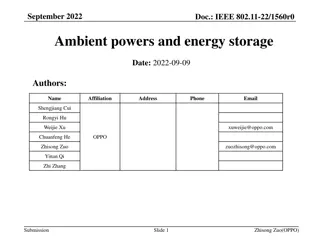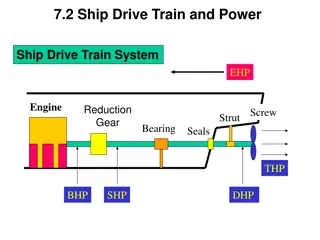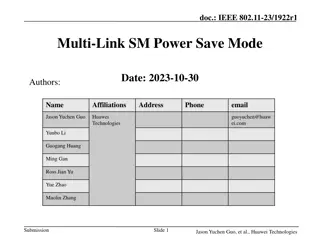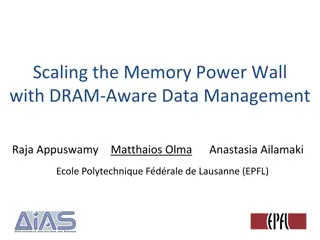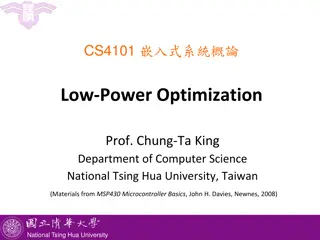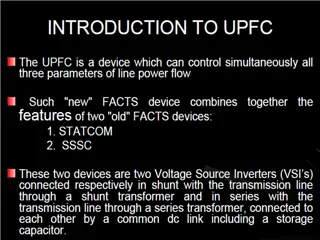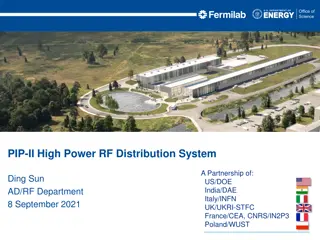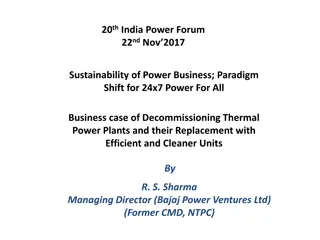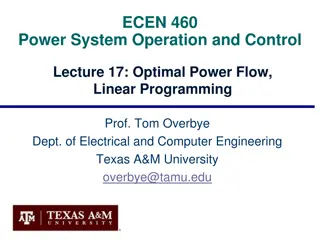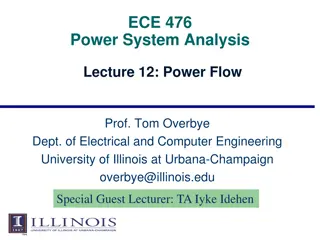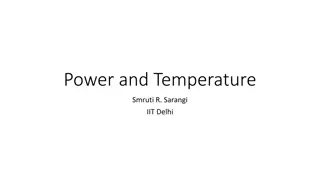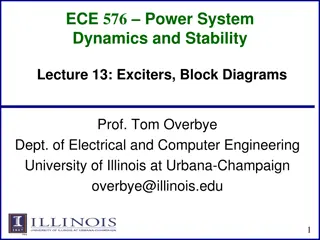Cisco Systems Fault Managed Power Portfolio Overview
Cisco Systems offers an industry-leading Fault Managed Power (FMP) patent portfolio comprising 24 active assets across seven INPADOC families. The portfolio includes patents supporting fault-managed power systems, PoE deployments, DC power distribution, DC-DC conversion, and HVDC connectors. The FMP
6 views • 4 slides
Great Power Rivalry in World Politics: Understanding Polarity, Balance of Power, and Hegemonic Transition
Great power rivalry involves deep competition and hostility between major players like the US, China, and Russia. The concept is explored through polarity, balance of power, and hegemonic transition theories, discussing power distribution, strategies, and transitions in the international system. The
4 views • 12 slides
Power System Fault Calculation and Protection Analysis
In this technical document, we delve into the calculation of fault current and fault apparent power in symmetrical three-phase short circuit scenarios within power systems. Through detailed equivalent circuit diagrams, reactance calculations, and per unit value derivations, the fault current and app
5 views • 15 slides
Improving Multi-Link Power Management Efficiency in IEEE 802.11 Networks
The document discusses challenges with per-link power mode changes in multi-link scenarios in IEEE 802.11 networks, proposing a solution for more efficient power management. It addresses issues such as latency and inefficiencies in signaling for power mode changes, introducing scheduled multi-link p
6 views • 9 slides
Power Transfer and Impedance Matching in Circuits
Exploring the concept of maximizing power transfer between a source and load through impedance matching. Learn about complex conjugates, real and magnitude of complex numbers, average power in circuits, and the importance of minimizing reflected power. Discover how incident, reflected, and delivered
3 views • 33 slides
Workshop on Future of Power Determination Regulations in Geneva
OICA is addressing concerns on power determination regulations for road vehicles, proposing a new UN-R to include system power determination. The agenda covers implementing system power in UN regulation, legislative scenarios, and GTR21 implementation proposals. Discussions focus on integrating syst
0 views • 9 slides
Ship Propulsion Power Estimation
In the process of ship design, it is crucial to estimate the power required for propulsion to determine machinery masses, fuel consumption, and tank capacities. Power estimates can be derived through comparisons with existing vessels or model tests, involving scaling laws for different components. S
0 views • 19 slides
Overview of Farm Power Sources and Utilization in Agriculture
Farm power sources in agriculture include human, animal, mechanical, and renewable energy. Human power is costly but versatile, while animal power is traditional and provides manure. Mechanical power from tractors and engines is efficient. India's farm power sources reflect a mix of traditional and
0 views • 12 slides
Power Transmission and Distribution Network of Tunnel Boring Machine Site
The power transmission and distribution network at the tunnel boring machine (TBM) site involves electrical motors, generators, transformers, and power cables to efficiently operate TBMs for tunnel construction. The system includes multiple generators, transformers, junction boxes, and power distrib
1 views • 7 slides
Sensitivity Analysis in Electric Power Systems
Sensitivity analysis in electric power systems involves examining the impact of parameter changes on system behavior. This lecture discusses linearized sensitivity analysis, matrix notation, injection shift factors (ISFs), and more, providing insights into system reliability and security. Concepts l
0 views • 43 slides
Metamodel-based Photovoltaic Monitoring System for Renewable Energies at Hongik University
This project at Hongik University focuses on developing a metamodel-based photovoltaic monitoring system to address the challenges of managing diverse solar monitoring systems in Korea. By utilizing a unified data communication protocol, the system aims to streamline the monitoring process for solar
0 views • 18 slides
Power Quality and Its Impact on Electrical Systems
Power quality refers to the characteristics of electrical power that drives sensitive equipment. It involves voltage and current deviations from ideal waveforms, impacting the efficiency and reliability of electrical systems. Various types of power quality phenomena exist, such as voltage variations
1 views • 16 slides
Power System Operation and Control: Lecture 13 Highlights
This lecture covers power flow, contingency analysis, and power system control in-depth. It discusses assumptions, load variations in a synthetic grid, and design cases for serving new loads. The importance of contingency analysis and solving large power systems efficiently is emphasized.
0 views • 30 slides
Power System Analysis: Key Concepts and Models
Explore the fundamentals of power system analysis through lectures by Dr. Kassim Al-Anbarri. Topics include modeling power system components, single-phase transformers, transmission lines, and more. Gain insights into transformer equivalent circuits, transmission line models, and voltage calculation
0 views • 31 slides
Insights into DRAM Power Consumption and Design Concerns
Detailed experimental study reveals that DRAM power models may not provide accurate insights into power consumption. The increasing importance of managing DRAM power in system design is emphasized. The study delves into DRAM organization, operation, and power consumption patterns, highlighting the n
0 views • 43 slides
Power System Dynamics and Stability: Multimachine Simulation with Implicit Methods
This lecture covers the use of simultaneous implicit and nonlinear trapezoidal methods for solving power system dynamics and stability in multimachine simulations. Techniques such as Newton's method for resolving algebraic equations alongside differential equations are discussed, offering numerical
0 views • 28 slides
ECEN 667 Power System Stability: Overview by Prof. Tom Overbye at Texas A&M University
In this comprehensive course on power system stability, Prof. Tom Overbye from Texas A&M University covers topics ranging from electromagnetic transients to energy function methods. The course provides insights into modeling synchronous machines, transient stability, signal analysis, and more. Prof.
0 views • 35 slides
Power System Analysis Lecture: Transient Stability with Prof. Tom Overbye
In Lecture 23 of ECE 476, Prof. Tom Overbye discusses transient stability in power systems. Topics include power system time scales, frequency variations, dynamics behavior, grid disturbances, and power flow analysis. Announcements regarding assignments and exams are also highlighted.
1 views • 25 slides
Power System Dynamics and Stability: Modal Analysis and PSSs
This lecture discusses modal analysis and Power System Stabilizers (PSSs) in power system dynamics and stability, covering topics such as eigenvalue calculations, generator models, and exciter effects. Key papers and examples are provided to enhance understanding and application in power systems eng
0 views • 27 slides
Helicopter Power Management Guidelines
Understanding the factors that can lead to power required exceeding power available in a helicopter is crucial for safe operation. Indications such as uncommanded descent, rotor droop, loss of tail rotor authority, and right yaw signal potential issues to watch out for. Knowing when such occurrences
0 views • 11 slides
Power Efficiency in Computing Systems
In this lecture series on energy-efficient computing, various concepts related to dynamic frequency scaling, power capping, power shifting, power modeling, and power measurement are discussed. The impact of power on server speed is explored, alongside strategies for improving performance within powe
0 views • 17 slides
Development of RF Power System for PRAE Linac Project
Development of an RF power system for the PRAE Linac project, involves the support of RF power and RF distribution for SESAME program. The project includes sourcing power for the gun and accelerating structure modulator, construction and testing of modulator components, and simulation of modulator o
0 views • 9 slides
Comparison of Electricity Power Systems Between CEPC and FCCee
The evaluation and comparison of electricity power systems between the CEPC and FCCee accelerators reveal the power breakdowns, RF power consumption, magnet power supply, and overall power usage. Differences in power consumption for various components such as RF, magnets, and vacuum systems are high
0 views • 19 slides
Ambient Power Harvesting Technologies Overview
This document discusses various ambient power harvesting technologies such as RF energy, solar power, light, and thermal energy. RF-based energy harvesting utilizes radio waves for power transmission with potential applications in logistics, smart homes, and environmental monitoring. Solar power off
0 views • 12 slides
Power Quality Monitoring and Evaluation in Modern Energy Systems
Power quality is crucial for stable operations in energy systems. This content discusses issues in power supply, reasons for measuring power quality, consequences of bad power quality, methods for measuring power quality, and evaluation techniques for compliance reports. Tracking power quality param
0 views • 21 slides
Ship Drive Train and Power Systems
Ship drive train and power systems play a crucial role in the propulsion of ships. Components like engines, reduction gears, screws, bearings, and seals work together to convert engine power into thrust horsepower (THP) that drives the propeller. Various types of horsepowers like effective horsepowe
0 views • 85 slides
Power Dynamics in the Hellenistic World: A Study of Olympias of Macedon
Exploration of power dynamics in the Hellenistic world through the multidimensional exercise of power by Olympias of Macedon. The study delves into various forms of power such as reward, coercive, legitimate, referent, and expert power, shedding light on their roles in shaping leadership and influen
0 views • 20 slides
Enhancing Power Efficiency in IEEE 802.11 Multi-Link SM Power Save Mode
The document discusses how Multi-Link Operation (MLO) in IEEE 802.11be can improve throughput and reduce latency but may increase power consumption for non-AP devices. It introduces the concept of Multi-Link SM Power Save mode to optimize power usage by activating multiple links only when necessary,
0 views • 10 slides
Power Consumption in Memory-Intensive Databases
This collection of research delves into the power challenges faced by memory-intensive databases (MMDBs) and explores strategies for reducing DRAM power draw. Topics covered include the impact of hardware features on power consumption, experimental setups for analyzing power breakdown, and the effec
0 views • 13 slides
Low-Power Optimization in MSP430 Microcontroller at National Tsing Hua University
This material discusses the significance of low-power optimization in modern devices, focusing on the MSP430 microcontroller features for energy efficiency. It covers topics such as energy conservation, power generation, and strategies for reducing power consumption at the device, circuit, and syste
0 views • 23 slides
Overview of Unified Power Flow Controller (UPFC) in Power Systems
A Unified Power Flow Controller (UPFC) is a combination of a Static Synchronous Compensator (STATCOM) and a Static Synchronous Series Compensator (SSSC) interconnected via a common DC link. UPFC allows bidirectional flow of real power and provides concurrent real and reactive series line compensatio
0 views • 20 slides
Leadership and Power Dynamics
Power and leadership are interconnected concepts, with power being the measure of a person's ability to influence others. Leaders have power in various situations, but it does not necessarily mean having power over people. Effective leaders balance their use of power with knowledge and trust, knowin
1 views • 9 slides
Industrial, Microbiological & Biochemical Analysis - Course Overview by Dr. Anant B. Kanagare
Dr. Anant B. Kanagare, an Assistant Professor at Deogiri College, Aurangabad, presents a comprehensive course on Industrial, Microbiological, and Biochemical Analysis (Course Code ACH502). The course covers topics such as Industrial Analysis, Microbiological Analysis, and Biochemical Analysis. Dr. K
1 views • 16 slides
PIP-II High Power RF Distribution System Overview
The PIP-II High Power RF Distribution System is a collaborative project involving various countries and institutions to develop a sophisticated system capable of efficiently distributing RF power to superconducting cavities. The system consists of multiple distribution lines and components designed
0 views • 28 slides
Discussion on Sustainable Energy Solutions and Efficiency Improvements in Thermal Power Plants
The 20th India Power Forum held on 22nd November 2017 highlighted the importance of sustainability in the power business, focusing on the paradigm shift towards 24x7 power for all. Topics included decommissioning thermal power plants for more efficient and cleaner units, with insights from industry
0 views • 16 slides
Optimal Power Flow in Power System Operation and Control
The lecture covers Optimal Power Flow (OPF) and Linear Programming in power systems, discussing economic dispatch, contingency analysis, and constraints such as power balance, voltage setpoints, and transmission limits. Various components and constraints of OPF, as well as example solution methods,
0 views • 38 slides
Power System Analysis: Lecture on Power Flow
Lecture 12 on Power Flow Analysis in Power Systems covers the use of power balance equations when analyzing complex power consumption and generation. It explains the derivation of real power balance equations for iterative solutions in power flow analysis. The lecture highlights the need for iterati
1 views • 30 slides
Benefits of UCD Sequencer in Power Management Solutions
UCD Sequencer offers full flexibility without coding, improved power reliability, fault logging, easy monitoring, and the addition of digital power features. It enhances system reliability, reduces inventory costs, and improves the quality of end products in server monitoring and sequencing solution
0 views • 11 slides
Power Consumption and Temperature in Electronic Circuits
Explore the significance of power consumption in electronic circuits, focusing on reasons for high power, high temperature, and low reliability. Learn about sources of power consumption, types of power dissipation, dynamic power analysis, and the relationship between energy and power in circuits.
0 views • 30 slides
Power System Dynamics and Stability: Exciters and Block Diagrams Overview
Explore the concepts of exciters and block diagrams in power system dynamics and stability through lectures by Prof. Tom Overbye at the University of Illinois. Learn about IEEE exciter models, including the evolution from T1 to DC1A, and delve into block diagram basics for simulating power system mo
0 views • 31 slides

